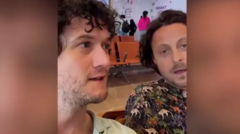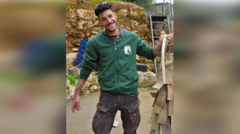The aftermath of the Air India plane crash continues to reverberate in the lives of victims' families, particularly as a grieving sister expresses anguish over the misidentification of her brother's remains.
Air India Crash: Family Voices Trauma of Wrong Remains Identification

Air India Crash: Family Voices Trauma of Wrong Remains Identification
Victims' families call for accountability, seeking dignity and closure in wake of tragic incident.
A woman whose brother was killed in the Air India crash is speaking out, saying that receiving the wrong body has inflicted additional trauma on her family. Fiongal Greenlaw-Meek, 39, and his partner Jamie, 45, were among the 242 individuals on board the ill-fated flight that crashed on June 12 shortly after departing for London Gatwick from Ahmedabad. Fiongal's sister, Arwen Greenlaw, confided to BBC Newsnight her family's urgent need for dignity and closure, alongside accountability concerning the mislabeling of her brother's remains.
The UK’s Foreign Office has reiterated its commitment to supporting affected families through dedicated caseworkers, clarifying that the formal identification of victims rests with Indian authorities. Expressing her profound sense of loss, Ms. Greenlaw demanded answers, stating, “If that is not possible – because the worst case scenario is that he has been cremated as somebody else – then we need to know that in order to move on.” She highlighted perceived flaws in forensic protocols at the crash site, noting the scene was uncontained for a prolonged period, underscoring, “It just can’t happen again.”
The jet, a Boeing 787-8 Dreamliner, was carrying passengers from various nationalities, including 169 Indian nationals and 53 Britons among others. Local fatalities near the crash site further increased the casualties to at least 270, which included medical students residing in the vicinity. A preliminary investigation has indicated a sudden fuel cut to the aircraft’s engines shortly after takeoff, but the reasons remain unclear. Cockpit recordings have revealed a concerning exchange between the pilots regarding the abrupt engine shutdown.
Following the crash, Ms. Greenlaw noted that their mother traveled to India for the identification process, experiencing the chaotic and overwhelming scenario firsthand. After a tumultuous journey, the family received what they believed to be Fiongal's remains, only to later discover inconsistencies, sparking further anguish. Tests concluded that the remains were of two different individuals. “It has been the equivalent of losing him twice,” she lamented, indicating the psychological toll this has taken on the family.
Amid the grief, reflections on Fiongal and Jamie’s vibrant lives emerged, with Ms. Greenlaw describing her brother and his spouse as “two halves of one soul.” The duo, co-founders of The Wellness Foundry in Ramsgate, were anticipated to participate in local community activities, leaving behind a community in mourning. The Foreign Office has been in continuous liaison with Indian officials to facilitate and support the identification process, expressing empathy for the distress families endure.
This harrowing episode has prompted wider discussions on air safety and crisis management protocols, following accusations of mishandling victims’ remains by officials. While families seek transparency and justice, India's foreign ministry emphasized adherence to established protocols in the identification process and assured its ongoing cooperation with UK authorities to address these serious issues.




















